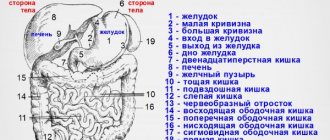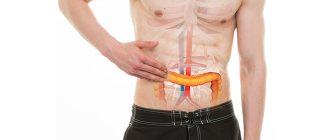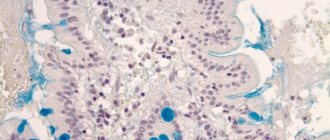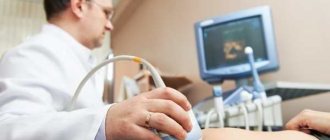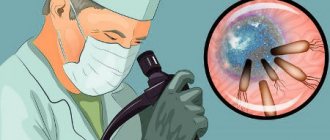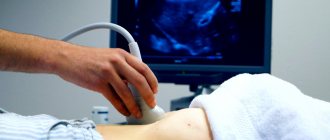People who have been scheduled for an ultrasound examination are interested in whether it is possible to eat before an abdominal ultrasound. There is usually no need to follow a diet before an ultrasound scan. An exception is the examination of the abdominal organs. Such diagnostics will provide maximum accuracy only with proper preparation. Otherwise, the result will be distorted by interference, resulting in an incorrect diagnosis.
Basic principles of ultrasound scanning of organs
The study makes it possible to assess the condition of the abdominal organs, which are filled with fluids and consist of solid tissue:
- liver;
- gallbladder;
- spleen;
- stomach;
- abdominal aorta;
- pancreas;
- biliary tract;
- duodenum.
During the procedure, the condition of the kidneys, which are located behind the peritoneum, is also examined. This diagnostic method allows you to determine the echogenicity of organs, which depends on the density of their tissues, visualize the structure of blood vessels, ducts and bile, determine the location and size of organs, see tumor-like formations, hematomas, stones, abscesses, thickening of organ walls, indicating the development of an inflammatory process.
Timing of ultrasound
Ultrasound during pregnancy is an effective and informative examination method
In case of a normal pregnancy and the absence of any abnormalities, a diagnostic method such as ultrasound is used three times. Initially, this procedure is prescribed at 10-12 weeks, but seeing the fetus at this period is quite problematic, since its size is still small.
Before performing an ultrasound at this time, a woman needs to drink a large amount of water before visiting the office and come to the procedure with a full bladder. This will allow the specialist to take a closer look at the reproductive organ and find out whether the fetus is developing normally in the uterus.
Often, the first ultrasound examination during pregnancy is performed transvaginally, when the sensor is inserted directly into the vagina.
When using this method of examination, you do not need to drink water at all, and you can eat almost anything.
A repeat ultrasound examination is performed at 22 weeks of pregnancy and does not require compliance with any special rules. Before the procedure, it is not necessary to drink a lot of liquid and you can eat absolutely any food. The third ultrasound is prescribed after 30 weeks and also does not require compliance with certain rules.
In what cases is examination indicated?
There are many reasons for diagnostics, the main ones are:
- paroxysmal pain in the right hypochondrium;
- the appearance of a bitter taste in the mouth;
- nagging pain in the epigastric abdomen;
- increased gas formation;
- the presence of belching, nausea and abdominal discomfort after the patient has eaten;
- preparation for surgery;
- performing a biopsy;
- organ injuries;
- suspicion of cirrhosis of the liver and neoplasms in the abdominal organs.
Scanning organs using ultrasonic waves is absolutely harmless to the human body; if there are appropriate indications, it is performed many times
Can I drink water before the procedure?
Many patients wonder whether it is possible to drink water before an ultrasound scan of the gastrointestinal tract. Experts unanimously answer: you should not drink water immediately before the procedure, but if it manages to go from the beginning of the journey to the end, then there is nothing to worry about. In about an hour and a half, the liquid will have time to be completely absorbed by the intestines, and the ultrasound examination will be as accurate as possible. Although in some cases the doctor may specifically ask the patient to drink water, especially when diagnosing the bladder. If the organ is filled with fluid, this will help simplify the visualization of the picture. In other cases, restriction of the drinking regime is strictly mandatory.
Of course, no one forces a person to give up water completely, since dry mouth is not a pleasant phenomenon. Therefore, to prevent this from happening, it is recommended to properly saturate your body with fluid. Drink several liters of water over three to four hours so that it has time to be absorbed by the body and reach all organs. Also be sure to drink a few glasses immediately before the test to completely eliminate the possibility of getting thirsty. If you follow this technique, you can go without drinking liquid for several hours.
Features of the diagnostic procedure
You will have to prepare for the examination in advance - proper nutrition and drinking regime affect the quality of the final data. Many patients are concerned about the question: “Is it possible to eat before an abdominal ultrasound?” In order to give a full answer to this, let's look at what can distort the image.
To obtain a reliable diagnostic picture of the examination, it is very important to exclude the following factors:
- muscle spasms of organs;
- food residues in the gastrointestinal tract;
- motor activity of smooth muscles;
- a large amount of gases in the intestines;
- a significant layer of hypodermis (subcutaneous fatty tissue), which is caused by excess body weight;
- filling the digestive organs with a contrast agent after fluoroscopy.
To conduct an ultrasound of the abdominal organs, the patient takes a horizontal position on his back; the doctor may ask him to take a deep breath or exhale, and take a comfortable position on his left/right side.
Foods that need to be excluded from the diet
Before the ultrasound procedure, you need to exclude gas-forming foods and products that lead to irritation of the walls and cause spasms of the smooth muscles of the gastrointestinal tract. Since the presence of gases and spasms not only complicate the diagnosis, but can also negatively affect its reliability.
Therefore, during preparation you will need to abandon:
- fatty meat, lard, salted and smoked semi-finished products;
- “non-lenten” poultry or kritsa cooked in oil;
- canned fish, fatty fish, including smoked or salted fish, caviar;
- milk (especially condensed with sugar), cream, sour cream, as well as fermented milk products;
- bran and coarse cereals (barley, millet porridge, brown rice);
- fruits and raw vegetables, as well as berries;
- mushrooms, nuts, dried fruits;
- dumplings, dumplings, sweet wheat pastries;
- rye bread;
- legumes (beans, soybeans, peas, lentils);
- fatty sauces (mayonnaise);
- canned vegetables and fruits, as well as juices (especially grape);
- cookies, pastries, cakes, halva, chocolate;
- herbs, spices, seasonings (horseradish, mustard);
- pickles and marinades;
- chips and puffed corn;
- drinks containing dyes and gases (including kvass);
- coffee, strong tea;
- low alcohol drinks (beer);
- grape wines;
- strong alcohol;
- lollipops and chewing gum;
- cigarettes.
If the patient has chronic diseases that require constant drug therapy, the doctor should be warned about this before carrying out preparatory measures. You will also have to give up antispasmodics (No-Shpa, Papaverine, Spazmalgon) and oral contraceptives.
If it is necessary to take cardiac medications, it is enough to notify the specialist conducting the study.
What is the preparation before an ultrasound of the abdominal organs?
The main goal of preparatory measures for ultrasound scanning is to ensure complete visualization of internal organs - this will allow the diagnostician to fully assess their condition. Most often, the examination is carried out in the morning, in some cases - in the afternoon. A patient who has adequately prepared for the diagnostic procedure can be absolutely confident in making an accurate diagnosis.
How often can an abdominal ultrasound be done?
When preparing for an ultrasound of the abdominal organs, the following points are considered the basic rules. You should not eat or drink 8–10 hours before the examination.
An exception is the diagnosis of the genitourinary organs - 1.5 hours before the procedure you need to drink about 1 liter of still water (drinking coffee and tea is contraindicated) and not urinate.
Three days before the study, the patient must eat a special diet - the essence of the diet is to prevent contraction of smooth muscles, minimize gas formation and irritation of the mucous membranes. Smoking is prohibited 2 hours in advance - nicotine causes spasms of the stomach and gall bladder. Before the session, you are not allowed to use chewing gum or breath freshening lozenges.
Ultrasound is not performed after an X-ray examination with a contrast agent, as well as colonoscopy (assessing the condition of the internal surfaces of the large intestine using an endoscope) and fibrogastroduodenoscopy (a method for examining the upper digestive tract). Diagnostics should be carried out at intervals of two days.
You need to worry about cleansing the intestines - do an enema or take a laxative 12 hours before the session. Failure to comply with any rule must be reported to the diagnostician, otherwise he may inaccurately interpret the resulting image. In addition, it is very important to provide him with information about the medications he is taking, especially antispasmodics - Dibazole, Papaverine, Drotaverine. If possible, it is better to avoid using them.
For patients suffering from diabetes, long-term fasting is contraindicated - before the procedure they can eat dried white bread and drink warm tea
The number of hours of fasting before testing for children differs:
- up to 1 year – you can’t eat for three hours before an ultrasound;
- up to 3 years – four;
- up to 12 years – from 6 to 8 hours.
A child should not drink water for one hour before an abdominal ultrasound.
What not to eat before an ultrasound
On the eve of the procedure, you should avoid those foods that, once in the gastrointestinal tract, cause fermentation and release gases. Gas-producing foods:
- any dairy, fermented milk products;
- sweets (sweets, cookies);
- rye bread, black bread, fresh baked goods, yeast dough;
- all legumes, spices, seasonings;
- carbonated drinks, packaged juices;
- alcohol;
- fruits: apples, pears, grapes and others.
Table of prohibited foods
| Proteins, g | Fats, g | Carbohydrates, g | Calories, kcal | |
| Vegetables and herbs (canned legumes, cabbage, radish, garlic, sorrel) | 2-9 | Up to 1 | 5-25 | 20-150 |
| Fruits (bananas) | 1,5 | 0,2 | 22 | 95 |
| Mushrooms | 3-4 | 2 | 2,5 | 30 |
| Nuts, dried fruits | 5-15 | Up to 40 | 20-60 | 300-500 |
| Snacks | 6-7 | 20-30 | 60 | 500 |
| Porridge (pearl barley, bran) | 5-10 | 1-4 | 10-30 | 100-200 |
| Dumplings, dumplings | 10 | 5-10 | 20 | 150-250 |
| Baking | 8 | 9 | 50-60 | 300-350 |
| Confectionery (cakes, cookies, halva) | 10 | 15-25 | 60-70 | 450-500 |
| Chocolate and candy | 5 | 30-40 | 50-60 | 500-600 |
| Milk and dairy products | 3-20 | 5-30 | 5-55 | 100-300 |
| Fatty meat (pork, lard) | 5-20 | 25-85 | 0 | 300-700 |
| Grocery | 15-25 | 30-35 | Up to 2 | 400-450 |
| Fatty poultry (goose, duck, smoked, fried) | 20-25 | 10-60 | 0 | 200-350 |
| Fatty fish (red, herring, smoked, canned) | 20-30 | 5-15 | 0 | 100-250 |
| Alcoholic drinks | Up to 0.5 | 0 | Up to 20 | 50-200 |
| Soft drinks (kvass, sweet carbonated drinks, grape juice) | Up to 0.2 | 0 | 10 | 30-45 |
How should you prepare for diagnosis?
The attending physician who has given the patient a referral for examination should give advice - what should not be eaten before an ultrasound of the abdominal organs and why, whether the procedure is carried out on an empty stomach or not, whether it is possible to drink water before an ultrasound and how much. You need to eat in small fractional portions, preferably take food at three-hour intervals, and you cannot drink it down. Before an abdominal ultrasound, you can drink purified or still mineral water, weak and unsweetened tea either 1 hour before a meal or 40 minutes after it.
During the day you need to drink 1.5 liters of liquid. Now let's look at the detailed recommendations. 3 days before the test, it is necessary to completely avoid eating food that increases the formation of gases in the intestines.
Prohibited products:
- baked goods – cookies, pastries, cakes, buns, pies;
- black bread;
- candies and chocolate;
- fatty fish and poultry;
- pork;
- legumes;
- sausages;
- fresh vegetables and fruits;
- sweet carbonated and alcoholic drinks;
- juices;
- smoked meats and spices;
- mushrooms;
- pickled vegetables;
- strong coffee;
- milk.
Consumption of grain porridges (barley, buckwheat, oatmeal), lean meat (beef, chicken) and fish, low-fat cheese, and boiled eggs is allowed. It is advisable to steam, bake or boil products.
To improve digestion and prevent gas formation, the patient is prescribed adsorbent and enzymatic drugs - Espumisan, Enterosgel, Creon, Pancreatin, Mezim, Festal
The evening before the procedure, until 20.00, a light dinner is allowed; it should not include fish and meat products (even dietary ones). If the patient is prone to constipation, before 16.00 you need to take a drug that stimulates bowel movements (Senade, Senadexin) or administer a Bissacodil rectal suppository. If the patient does not tolerate laxatives well, a cleansing enema is prescribed 12 hours before the diagnostic session.
On the day of the examination, breakfast is excluded! Is it possible to eat in the morning if the procedure is scheduled for 15.00? In this case, food is allowed until 11.00, and two hours before the test the patient must take 2 capsules of Simethicone or 5 to 10 tablets (depending on weight) of activated charcoal. Eating should take place in a calm environment, without talking or rushing - this will avoid swallowing air.
Prohibited and permitted products
The diet before an abdominal ultrasound is aimed at high-quality visualization, obtaining the most accurate results and preventing distortions. Therefore, for 3-4 days before the examination, you need to pay special attention to nutrition. It is necessary to consume foods that minimize irritation of the mucous membranes and gas formation, and prevent contraction of smooth muscles.
Foods that increase gas formation should be excluded from the diet:
- black bread;
- baked goods;
- fatty meat and fish;
- chocolate and candies;
- vegetables and fruits;
- legumes;
- sausages;
- smoked meats;
- fried foods;
- pickles and marinades;
- herbs and spices;
- mushrooms;
- dairy products;
- coffee and strong tea;
- juices;
- carbonated and alcoholic drinks.
You are allowed to eat porridge from various cereals, boiled in water, lean meat, lean fish, boiled eggs, hard cheese, and white bread. Food needs to be steamed, boiled or baked.
Many people are accustomed to drinking coffee in the morning. But before diagnosis you will have to refrain from this habit. The drink changes the functionality of internal organs, increases vascular tone, relaxes the muscles of the bile duct, and stimulates the activity of the gallbladder.
You can drink tea, but it should be unsweetened and weak. It is recommended to give preference to green tea or a drink made with herbs. But you should not drink it on the day of diagnosis, as it also contains caffeine.
During preparation for an abdominal ultrasound, you can adhere to the following menu:
- Breakfast - one boiled egg, green tea.
- Lunch - a piece of low-fat hard cheese.
- Lunch - boiled or steamed dietary meat, compote.
- Afternoon snack - porridge.
- Dinner - boiled or baked low-fat fish, still mineral water.
Following a diet before diagnosis will not only ensure high accuracy of the result, but will also benefit the body - it will have a healing effect, allow you to lose several kilograms, and reduce the load on the internal organs.
Approximate daily menu
It is very simple to properly prepare for an examination of the abdominal organs; the main principle of the diet is nothing superfluous! Especially in cases where the organs being studied are in the acute stage of the inflammatory process.
- Breakfast – one soft-boiled chicken egg and a cup of green tea.
- Snack – a small piece of low-fat hard cheese.
- Lunch – a portion of dietary meat, steamed or boiled in lightly salted water, a cup of weak tea.
- Afternoon snack – a serving of grain porridge.
- Dinner – a portion of lean fish (it can be boiled or baked), a glass of still mineral water.
The advantages of restricting the diet are: benefits for the whole body, slight loss of body weight, high accuracy of the final ultrasound data.
Immediately after the diagnosis is completed, the patient can return to their usual diet, without any restrictions.
At the end of the examination, the diagnostician gives the patient a protocol with a description of each organ, it indicates all the identified changes and a preliminary diagnosis. The course of medical therapy will be prescribed by the doctor who issued the referral for examination. In the absence of pathology, the summary is given in the conclusion: “The organs of the abdominal cavity have no special features.”
In conclusion of the above information, I would like to emphasize once again that a qualified specialist, when sending a patient for an ultrasound of the abdominal organs, always informs him about the importance of proper preparation for the study. However, it also happens that the doctor forgets to warn or assumes that everyone knows about the need to follow a special diet. That is why in our article we have provided all the necessary detailed information about the procedure for preparatory measures for ultrasound scanning.
How is ultrasound performed?
Ultrasound diagnostics of the abdominal cavity is performed only on an empty stomach. You cannot eat before the examination - the last meal should be 5-6 hours before the ultrasound, no later. Otherwise, the research will be seriously hampered, and it will no longer be possible to vouch for the accuracy of these data. A few days before the ultrasound, a special diet is prescribed, from which all heavy foods are excluded. You can eat steamed fish, meat and vegetables, and whole grains boiled in water.
List of organs for which ultrasound is prescribed:
- Liver;
- Spleen;
- Pancreas;
- Gallbladder;
- Lymph nodes, vessels.
This list does not include the organs of the digestive system; their diagnosis is difficult due to the large amount of gases. To check the condition of the stomach or intestines, other, no less effective diagnostic methods are used.
An ultrasound examination is carried out by a specialist who is able to both carry out the diagnosis correctly and correctly interpret its results. An ordinary therapist, or any other medical professional, does not have the right to do this if he does not have special education.
It is often prescribed in the morning, at which time it is easier for a person to endure hunger. If you schedule an ultrasound for the afternoon, you will have to endure it all day. The first in line are children under 4 years of age, people with diabetes or hypoglycemia, pregnant women - it is most difficult for them to endure the necessary hunger strike. They are allowed a light snack: for adults, lightly sweetened tea, a cracker, for children, a fruit like a banana. This is allowed as a last resort, if it is no longer possible to endure. In order for the ultrasound readings to be objective, you should wait several hours without food.
Diagnosis is non-invasive and painless. Before the procedure, you need to remove or lift your jacket and lie down on the couch. Then a viscous gel will be applied to the abdomen: it facilitates the passage of ultrasound waves through the skin, so the image on the ultrasound machine screen is stabilized. The gel is cold, so the first few seconds will be a little unpleasant. It quickly becomes warm, the operator intensively moves a hand sensor over the skin.
During the test, you may be asked to hold your breath, roll over on your side, or stand up. To see a specific organ more clearly. Unpleasant sensations are possible; if you have acute pain, then the pressure of the sensor, which is sometimes strong, may still be felt painful.
Other than that, the procedure is simple. It is completely non-traumatic and takes no more than 15 minutes.
Do I need to follow a diet before an ultrasound?
A very popular question, especially among the fair sex, who always try to monitor their figure with the help of a balanced diet. However, before an ultrasound, any patient is advised to refrain from consuming the following foods:
- juices, fruits, and raw vegetables;
- spicy, fatty and fried foods;
- carbonated drinks and coffee;
- confectionery;
- fatty meats;
- black bread;
- milk.
All of these products are not recommended for consumption within three to four days before the test. However, it is quite possible that after the procedure the doctor will prescribe you a special diet that you will have to follow. Proper nutrition should not only be balanced, but also fractional, so that the body has time to digest the foods that enter it.
What about tea?
Many people know whether it is possible to drink water before an ultrasound of the intestine or not, but few people think about whether black or green tea is included in the category of prohibitions. In fact, this drink is even recommended before an ultrasound procedure, as it relieves most inflammatory processes, eliminates bloating and relieves cramps.
However, lovers of too strong tea are advised to refrain from drinking it or reduce their concentration. The same goes for tea with a lot of sugar. All this can lead to spasms of the biliary tract and intestines, so you should avoid drinking rich drinks. The best option would be a cup of hot tea (black or green) with one spoon of honey or without it at all.
The last consumption of tea should occur one hour before the ultrasound examination. In addition, the maximum volume of the drink should not exceed 250 milliliters, since too much tea may lead to inaccurate test results. It is also not recommended to drink a drink that is too hot, as this can cause intestinal or stomach cramps.

